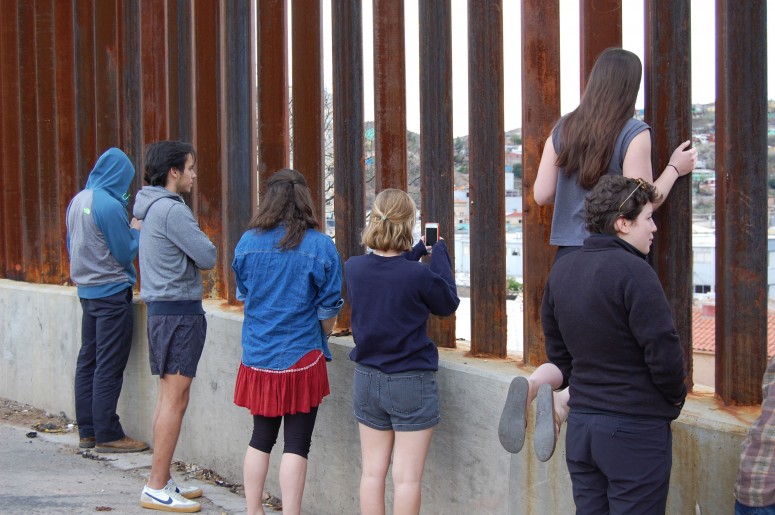Bridging Borders

From Kenyon News - March 25, 2015
Standing in Arizona with her classmates at a towering fence of metal bars, Aubrianna Osorio ’17 peered through at Mexico and questioned the connection she felt with the country from which half of her family originates.
The wall was one stop on a spring break study trip to Arizona and Mexico for Osorio and 11 other students in a sociology class called “Borders and Border Crossings.” The class wrote a blog called “Borderlands” during the trip to chronicle their thoughts while visiting sites including a migrant shelter, a federal detention center and a border patrol station.
Osorio, from Long Beach, California, wrote that she had hoped to connect with her Mexican homeland. But the reality for people crossing the border was harsher than she could have imagined, she said.
She wrote after visiting the border fence:
“Faced with a 20-foot wall designed to separate nations and communities and families, I found it impossible to be the Mexican-American I’ve always considered myself. The wall told me that I was American, that I grew up in the suburbs and watched Fourth of July fireworks at block parties. It reminded me that I can’t even speak decent Spanish. Standing at the wall, it didn’t matter how many hours I’d spent making tamales every Christmas, or how many sitting at my grandparents’ kitchen table. The border makes you choose.”
On their first day, students said they had a rough introduction to migrants’ experiences. They sat in a court used for fast-track prosecution of Mexicans and Central Americans charged with illegal entry, known as Operation Streamline. They could hear the metal shackles jangle on the 65 men and women who gave up their right to trials and pleaded guilty in the 50-minute session.
“It was only when the immigrants were dismissed from the courthouse, with shackles on their wrists, waists, and feet, that we first saw their faces. Whether or not their actions were worthy of a conviction, it was difficult to reconcile a system of justice to one that propagated the dehumanization of vulnerable individuals.”
The group hiked part of a trail migrants used, and some said they wanted to complain about the hills and heat but didn’t. Others have had far worse journeys, they said.
They left pop-top cans of beans and gallon jugs of water along a trail, writing “good luck” and “you have friends” on the sides and hoping that opponents wouldn’t slash the jugs to spill the water.
This was the second time the class, taught by Jennifer Johnson, associate professor of sociology, made the border trip. Johnson said the group met people held at the federal detention center who did not know when their cases would be resolved. Some said they faced shunning by families or even violence if deported because they are lesbian, gay, bisexual or transgender.
Despite their undecided fates, the detainees chatted up students about everyday topics and had positive attitudes. That resiliency left a powerful impression on the group, Johnson said.
At times, the students felt hopeful because of the many people trying to stop suffering and deaths at the border. The activists’ decision to help was “a social necessity more than just a casual choice,” Osorio said after the trip.
However, students said they had doubts, too, about how much of a difference any individual could make.
“Despite learning of all of these incredible people and the work that they do, it’s hard to avoid the feeling that it is all somewhat futile in contrast to the massive scope of the power of the global economy and the technology and manpower afforded by the Border Patrol’s massive budget.”
Kenton DeBouter ’17, a sociology major from Oberlin, Ohio, said he plans to donate money to an aid organization the class visited. He has struggled when trying to engage people in meaningful conversation about border issues since he returned. “You realize how far removed it is from some people’s lives,” he said.
Still, some members of the class said the trip caused them to consider getting involved in social activism. The course requires the students to organize an event to share their research with a Kenyon audience.
Edgar Arceo ’15, a psychology major from Minden, Nevada, said Americans’ fears of terrorism are legitimate, but he hopes a dialogue with people removed from the border will remind them how the country’s reactive policies have affected average people crossing the border.
“We don’t consider that it’s the tomato picker that’s trying to cross, by and large,” he said. “It’s people who are trying to have a better life for them and their families.”
While still on the trip, the students lit candles for someone who impacted them that week.
“Some of us lit them for detainees and migrants while others lit one for Border Control. This was not necessarily done in a religious vain, but rather as a sign of acknowledgement — a way of saying: ‘You taught me something I could not learn in the classroom.’ ”